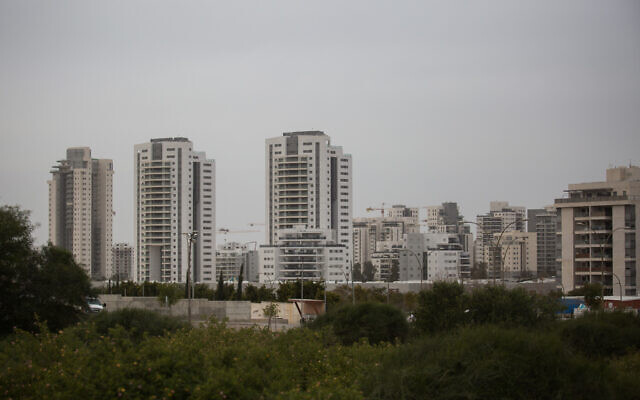Israel to market 30,000 affordable housing units in 2022
First batch of 10,000 units will available to eligible buyers under lottery system by April, says Housing Ministry

The Ministry of Construction and Housing and the Israel Land Authority (ILA) said Wednesday that some 30,000 affordable housing units will be listed for sale this year, starting with 10,000 units set to go on the market before the Passover holiday in April.
The initiative encompasses more than 80 cities and towns throughout Israel including Ashdod (1,100 units), Haifa (1,300 units), Beersheba (900 units), and Yavneh (1,100 units), according to the announcement.
The apartments are intended for first-time homebuyers, young families, single-parent households, and low-income individuals deemed eligible for affordable housing under one of several Housing Ministry programs including “Buyers’ Price” (Mehir Lamishtaken), launched in 2015 and now being phased out, and the “Target Price” (Mehir Matara) introduced last year by the new Housing Minister Ze’ev Elkin.
The “Buyers’ Price” program was initiated by former finance minister Moshe Kahlon as a lottery system under which apartments would be built mainly outside central Israel and sold at discounted prices to applicants who meet certain criteria.
The project was aimed at lowering Israel’s spiraling housing prices and making homeownership more accessible. But the program has been criticized for not providing the quality, size, and location of apartments suitable for the intended buyers.
“Target Price” also operates as a lottery system and offers a discount of 20% or up to a maximum of NIS 300,000 ($93,460) on the apartment purchase price in addition to grants of up to NIS 40,000 ($12,460) in certain areas. The latest affordable housing program focuses on areas in Israel’s so-called “periphery,” often with lower socioeconomic rankings according to the Central Bureau of Statistics. In many cases, these towns are far from the country’s center and have underdeveloped transportation systems and employment opportunities.
Under the “Buyers’ Price” program, grants of NIS 40,000-60,000 ($12,550-$18,820) were approved for eligible buyers in specific locations, often those in remote areas or where demand was lower. It was limited to buyers in projects where the underlying land value of the apartment was estimated at below NIS 100,000 ($31,150).
“We worked to bring the [affordable housing program] target price that gives a discount of hundreds of thousands of shekels,” Elkin said in a statement Wednesday.
“This year, we will roll out tens of thousands of apartments at a discount, both from past programs and from the Target Price program for young couples so that they can purchase apartments at a reasonable price. I am proud of the work of the ministry and the ILA that worked night and day to bring results on the ground. I rely on and trust that during next year, the real estate market in Israel will change,” he added.
According to the ILA website, from December 2020 until December 2021, land tenders for the development of over 20,000 affordable housing units were listed as closed. Though many of the tenders closed over a year ago, in many cases the winning developer remained undetermined. The website listed the tenders as “under assessment by the ILA tenders committee.”
The ILA did not respond to a request for comment.
Last October, the government announced an ambitious housing plan for 2022-2025, aimed at rapidly increasing the supply of apartments in the hopes of reducing prices and combating Israel’s spiraling housing crisis.
The plan set a target of starting construction of 280,000 homes over the next four years — significantly more than in recent years — advancing plans for 500,000 more housing units, publishing tenders for 300,000 homes on state-owned land, and having 180,000 successful such tenders.
Reforms to reach those goals include reducing bureaucracy in general, particularly for unique housing projects — such as ones that aim to demolish old buildings to rebuild new ones in their place — and projects that convert offices to residences.









